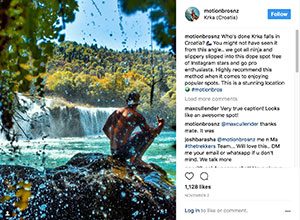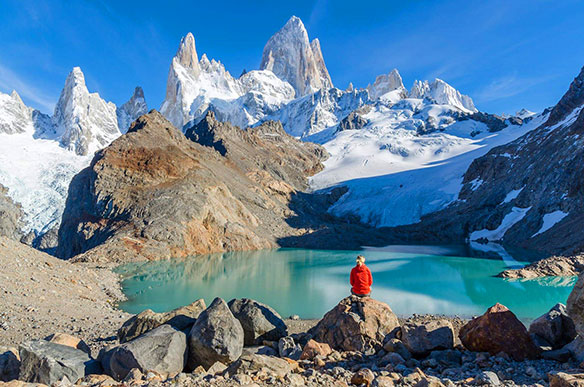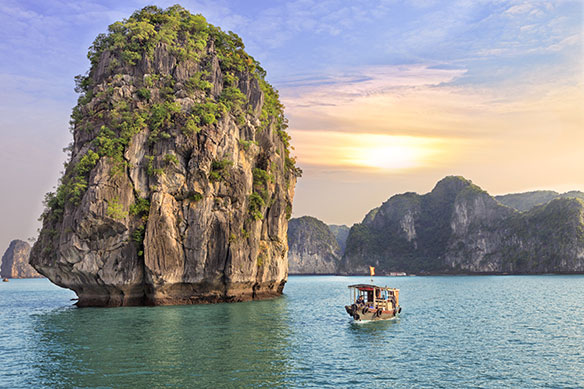
Looking back, moving forward
Tour operators talk about the year that was and what’s to come
ANN RUPPENSTEIN
From the Trump Slump or the Trump Bump to travel bans and natural disasters, the past year was full of surprising moments that impacted the travel industry. Here we sat down with Canadian and international tour operators to get the lowdown on what was unexpected in 2017 and what to expect in 2018.
What a surprise!
Looking back at 2017
When asked to identify the most unexpected thing that impacted the travel industry over the last year, Norman Howe, president and CEO of Butterfield & Robinson, points to how positive the American election was on outbound travel.
“For at least the first six months of the year, the so-called Trump effect drove the US stock markets higher, the US dollar higher, and US consumer confidence higher, so that people had more money to spend and felt more confident committing to travel,” he tells Canadian Travel Press. “While it might be tempting to think that some of the outbound exodus was due to people feeling the need for a break from the domestic roller coaster, I actually think it was motivated more by pure optimism.”
In turn, the Toronto-based active travel company adapted by adding more departures to soak up the excess capacity, and adding more options for private travel around the world.
“The challenge of 2017 was the best kind – managing excessive growth, while not compromising on the quality of the experience,” he says.
Although 2017 brought a fair amount of challenges across world events and terrorist attacks, Ulla Hefel Böhler, CEO, Insight Vacations and Luxury Gold, says the market was resilient and bookings bounced back, especially with the support of agents.
“Our clients chose to travel and make educated choices despite — or perhaps because of — everything, and there was an unbelievable amount of positivity and resilience,” she says. “I remember receiving many sincere letters from our guests from across the globe advising us that they would not let world events get in the way of their holiday plans.”
While the adventure travel company doesn’t run programs in most of the affected areas, G Adventures founder Bruce Poon Tip says the hurricanes in Florida and the Caribbean also had a devastating impact this year.
“The increased isolation of the US from the global community brought on by Trump also had a significant impact on travel in and around the USA, from the stop/start travel bans, to constant talk of a wall, to tensions with Europe, Turkey, China and Russia,” he adds.
Although The United Nations declared 2017 the International Year of Sustainable Tourism for Development, Intrepid Group CEO James Thornton says much of the focus was actually put on overtourism.
“Instead of seeing positive stories about the impact of tourism this year, we’ve seen the industry hit the headlines for the wrong reasons with locals protesting against overtourism in cities like Barcelona and Venice,” he says. “It’s surprising and a little ironic that this is only now becoming a hot topic for the industry.”
Cuba conundrum
For Trish Sare, the founder and director of BikeHike Adventures, the year was a bit of a roller coaster surrounding travel to Cuba, which was the adventure travel company’s hottest selling destination in 2015 and 2016.
“In June 2017, Trump announced new travel restrictions for Americans who wanted to travel to Cuba, basically reversing much of the policy that Obama had put into place,” she says. “Sales and requests plummeted overnight throughout the summer months, as Americans were nervous about what the implications of travelling to Cuba would be for them.”
After sending her team to the Caribbean destination to investigate the policy changes and how the implications would affect the Canadian company, she says they came to the conclusion that all would proceed as normal until the new policy restrictions were actually put into place.
“Our confidence in selling Cuba again increased, and along with that, so did sales, until November 8th,” she says. “On November 8, Trump formalized the strict new policy restrictions for Americans who want to travel to Cuba, once again making it much more complicated, for both them and us, to accept US travellers who want to travel there.”
Going the distance
For Hefel Böhler, another positive surprise over the last year was discovering guests wanted to get out of their comfort zones and travel further away for life-changing and immersive experiences.
“There was pent-up demand to explore the world,” she says, noting an increase in bookings beyond Europe, and that its Luxury Gold collection offered new journeys to Southeast Asia (Laos, Vietnam, Cambodia, Sri Lanka), Australia, New Zealand, and South America, including the Galapagos.
Similarly, Jaclyn Leibl-Cote, executive vice president of product and tour management at Collette, also found the year proved positive for travel across the board.
“The big rebound propelled us to be in a much better position as the year comes to a close,” she says. “In order to manage product development demand, as well as sales demand, it’s crucial to look ahead at trends and try and forecast from an inventory standpoint. We were pleasantly surprised at the increase in travellers that we needed to accommodate.”
Meanwhile, Jennifer Haddow, owner and director of Wild Women Expeditions says one of the biggest surprises was seeing just how many women became leaders in the adventure travel industry.
“You see the explosion of offerings for women in every area of adventure travel,” she says. “One of the biggest transformations I am seeing is the rise of female guides and strong women leaders who are carving out more space, from safari tours in Africa to trekking in the Himalayas and Peru, there is a movement of local women taking on more active roles in defining travel experiences and leading tours. That wasn’t very visible even a decade ago, so it’s an exciting new horizon that is making waves in a position direction.”
Get social
One of the biggest surprises for Gavin Tollman, the CEO of Trafalgar, was the level of guest engagement across social media.
“From being able to respond to real-time feedback, to adapting the on-trip experience if or where necessary, the importance of this channel is immense,” he says. “Knowing what our guests enjoy helps us to personalize the experience. This burgeoning social element of travel will continue to have a significant impact on the industry.”
Welcome to the future
What to expect in 2018
Looking ahead to what’s in store for 2018, Ulla Hefel Böhler, the CEO of Insight Vacations and Luxury Gold, believes transformative travel will be the epitome of what travellers want.
“The desire for genuine human connection and getting behind the tourist curtain of a destination — this is certainly a key driver for today’s travellers,” she tells Canadian Travel Press. “Guests are seeking local and immersive experiences that reveal the heart and soul of a destination and enables them to have meaningful connections. They are seeking unique experiences which are not found in guidebooks and may be difficult to easily arrange or find. Also, food plays a big role for 2018 since it is truly a sensory experience.”
To meet this demand, Insight Vacations and Luxury Gold is offering authentic dining experiences like foodie walks, farm-to-table meals, hands-on cooking classes and “Dine-at-Home” excursions in locals’ homes.
“Exploring iconic sights still play an important role, but in addition to the must-sees and must-dos on our clients’ bucket lists, it is absolutely essential to offer authentic local experiences,” she adds.
The big trends
As for trending destinations, Hefel Böhler says Europe remains popular with bookings for Spain, Portugal, Italy, Croatia, the UK, Ireland, and Eastern Europe continuing to be strong.
“We are certainly seeing strong interest in France return, and the same applies to Egypt, too,” she notes. “Further afield, Canada is extremely popular, so are Japan and South Africa.”
At G Adventures, founder Bruce Poon Tip points to Central Asia as the fastest, growing region in the world for the adventure travel operator.
“I’m hoping to see a huge bounce back in all parts of Africa,” he adds. “The continent was severely disrupted by the west coast issue of Ebola, which was unfair for the rest of the neighbouring countries.”
Over at Intrepid Group, CEO James Thornton reveals small ship cruises will be the next big thing.
“Last year, we launched our first season of Adventure Cruises under our Peregrine Adventures brand using small ships with no more than 50 travellers on-board, enabling travellers to visit the small ports that big ships can’t get to and explore little-known towns and villages,” he says. “The first season was 95% sold out, so this year we’ve tripled the number of itineraries in Europe and now we’re about to launch five itineraries in Southeast Asia.”
Sustainability trumps
As well, Thornton says more and more travellers are searching for sustainable alternatives, while exploring the world.
“In Dubrovnik, cruise ship travellers are being called ‘ice cream tourists’ by locals because they’re overcrowding the UNESCO World Heritage City, but that’s all they’re buying,” he says, adding the adventure travel company makes an effort to positively impact local economies by employing local staff, using local accommodation, eating in local restaurants, and travelling on local transportation. “We only ever travel in small groups, we get off the beaten track, and we avoid visiting popular places at peak time. This is the way we’ve been travelling for nearly 30 years, but we might actually finally be trendy – it’s going to be the future of travel!”
Similarly, Jennifer Haddow, the owner and director of Wild Women Expeditions says the rise of traveller interest in sustainable, authentic eco tours, especially within the luxury realm of adventure travel, will be the next big thing.
“Travellers don’t want to be in a bubble, they want curated experiences, but with a focus on authenticity and real connections with local communities and the natural environment,” she says. “There is a growing awareness that tourism is a force for social change, and I think the industry is responding to the call from travellers to be more ethical and give back to the places we visit.”
Sustainability is also big across The Travel Corporation’s brands, with Hefel Böhler noting, “more and more travellers would like to travel with purpose and are educating themselves with companies who are committed to sustainable travel.”
As such, she says it’s important for guests to witness and experience sustainable tourism projects first-hand, whether it be visiting a women’s hand-weaving cooperative in Perugia, which helps to keep the ancient tradition alive, or embarking on a ME to WE culturally immersive experience where travellers can work on an international sustainable development project, while spending time with local families.
“For travel to remain true to people and place, we must ensure that we work to grow tourism in a sustainable manner – assisting local communities to celebrate who they are, respecting their uniqueness, as a prelude to building their economy and protecting their environment,” adds Gavin Tollman, CEO, Trafalgar. “We are hearing more and more from our travellers that they are becoming increasingly engaged with spending their money on sustainable ventures. It is not about being eco-friendly, it is about being environmentally-conscious – being part of the bigger picture, preserving something for the long term.”
Personalization is king
For Jaclyn Leibl-Cote, executive vice president of product and tour management at Collette, the year ahead will be all about personalization and customization.
“We’ve spent a great deal of time listening to what the consumer wants,” she says. “We know that they want more choice on tour and that these choices need to be included aspects of the tour. We’re going to continue to bring more of this choice in the coming year, as we develop product.”
In the same way, Trish Sare, the founder and director of BikeHike Adventures says they are encountering an increase in custom groups and that set departures are becoming less attractive.
“Our travellers look to our current set departures, but choose their own dates, perhaps upgrade the accommodation and tweak the itineraries, so that they fit the travellers like a glove,” she says.
While BikeHike has always focused on transformational experiences where travellers can get up-close to the locals and having genuine cultural encounters with people and food, Sare says over the last few years, the trend has become more mainstream in the adventure travel realm, and as a result, the marketplace is expanding.
“I foresee this trend to continue gaining strength in the near future,” she says. “I think that industry experts need to adapt their offerings to cater specifically to the needs of these travellers — i.e. shorter or longer duration, accommodation level, multi-country trips, more or less active, self guided experiences.”
Insight’s Hefel Böhler agrees, saying that, “having a personalized and tailored experience no matter where and how you travel is paramount. Each guest wants a travel experience that meets and exceeds their personal needs and expectations and is tailored to their interests. Choice and flexibility are becoming increasingly more important, too.”

A recent Stackla study found that 86% of travellers thought authenticity was important when deciding what brands they like and support and 60% said user-generated content is the most authentic form of content
A digital world
For Norman Howe, president and CEO of Butterfield & Robinson, one of the biggest drivers of change within travel will be the continued flight to digital.
“In particular, the ability to access local people and experiences with confidence will be pivotal,” he says.
Whether it’s local accommodation or local tours and experiences, he says the drive to go local will disrupt many aspects of travel, especially for traditional intermediaries. With the decline of the traditional group travel and the rise of peer-review power, such as a growing dependency on TripAdvisor, Tour Radar, he says survival will depend on the ability to adapt and to add value for travellers.
“Customer stickiness and brand loyalty will be the only priorities that matter,” he says.
At Busabout, managing director Duncan Robertson believes the year ahead will be all about authenticity.
“In a recent Stackla study, 86% of travellers said that authenticity is important when deciding what brands they like and support and 60% said user-generated content (UGC) is the most authentic form of content,” he says. “In the same report, 57% of millennials have made travel plans based on an image or video they saw a friend post on social media. It comes as no surprise since millennials spend five hours per day with UGC; and up to nine hours a day on social platforms, while 30% of all time spent online is now allocated to social media interaction.”
This growing trend had a major impact on the operator, leading Busabout to redesign its 2018/19 brochures. In fact, over 95% of the brochure imagery and 100% of the company’s new website feature images taken by clients, while travelling with the brand.
“It’s one thing to talk about it, but it’s quite another to show it from a real-life traveller’s perspective,” he says. “We even mapped over 110,000 travel experiences over the past three years to create a completely open connection between past passengers and hopeful new clients, as a way to inspire them to travel with us by showing them actual Busabout experiences that they can embark on.”
Unique moments
As for Contiki Holidays, chief executive Casper Urhammer says in 2018 the operator will be focusing on its new Independent Insider travel style, which was launched to meet the changing needs of travellers, who were looking for more freedom and flexibility, with more time in each destination, free time and plenty of optional activities.
“In addition, food remains a strong driver and carrier of culture, and we keep perfecting our food philosophy, what we like to call Munch, and we plan to roll it out across our entire program,” he adds. “Authentic travel experiences and getting to experience the things that would be hard to do on your own continues to be a core unique selling point.”
While hotels, sights, and destinations are important, he says often the most special memories come from the transformational journey the 18-35 year old travellers experience like unexpected moments and new friendships.
“The Power of Travel, really is our other big focus,” he says. “We are in the business of showing young travellers the world and that often leads to people becoming better humans.”
One of the newest experiences across many of The Travel Corporation’s sister brands, is a partnership with VizEat, which offers travellers the opportunity to dine with locals in their own homes in destinations in Europe.
Off season and beyond
Finally, at Trafalgar, Tollman feels 2018 will bring a seismic change in travel patterns.
“We will see more and more savvy travellers choosing to make their plans for the off-season,” he says. “Seasonality per se will no longer exist – it will be replaced by year-round travel. Readjusting mindsets to embrace year-round travel will offer significant benefits to both traveller and destination.”
Especially as the debates around overtourism continue to rage, he says choosing not to visit certain destinations at peak periods helps sustain livelihoods by keeping the businesses operating year-round.
“For holidaymakers, it gives them the feeling of being warmly welcomed as a traveller not a tourist, it diminishes the chances of enduring snaking queues and battling the precious photo moments with thousands of others, as well as avoiding wasted travel time in traffic,” he says.
The millennial factor
“Most of the industry colleagues are catering to the demographic of 50+ nowadays, and not many that I know are reaching millennials effectively. They are a very large cohort, many have a great deal of disposable income and they want to spend their vacations on experiences rather than material, and are willing to step outside of their comfort zones much more so than that of the baby boomer generation. In the future, I foresee new companies developing, started by millennials, and catering specifically to their very specific needs. These companies will very likely change the landscape of the way that travel is booked today, they already are, but I can imagine seeing a more a-la-carte reservation system. Who knows, maybe another Mark Zuckerberg will develop a platform to cater to this cohort. I think there is a lot of money to be made for the one who can figure out how to cater specifically to them.”
-Trish Sare, founder and director, BikeHike Adventure
“There are numerous studies that focus on how more and more travellers are looking for flexibility and personalization of their vacations to suit their budget and time, however, a study conducted by HVS Global Hospitality Services found that 58% of millennials prefer travelling with friends or as a group, which is 20% higher than previous generations.”
-Duncan Robertson, managing director, Busabout




